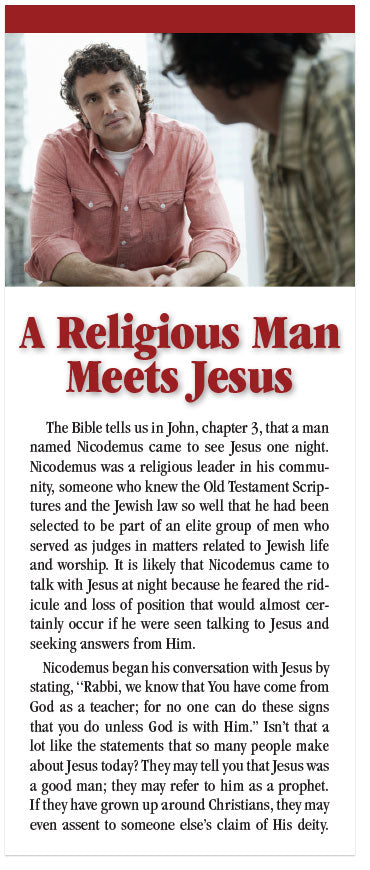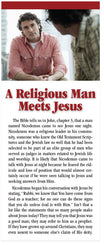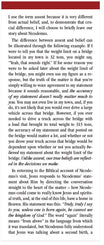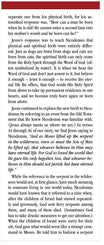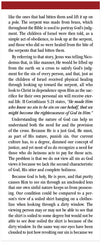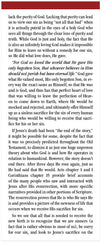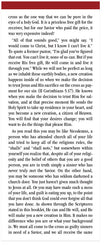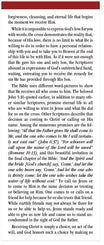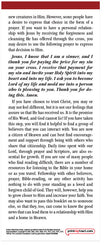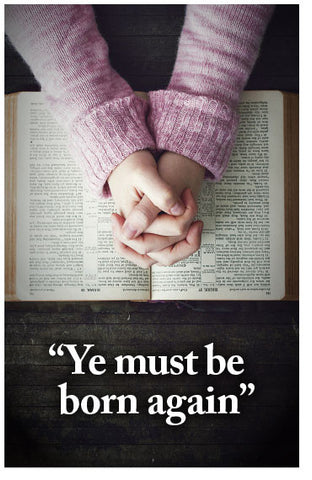A Religious Man Meets Jesus (NASB)
Special-Order Folded Flyer Tract
 NOTE: This item is custom-printed to order (click for more details).
NOTE: This item is custom-printed to order (click for more details).
This tract is from our print-on-demand library, and is not kept in stock. Select the options below, and we will custom-print a batch just for you.
- Estimated shipping date: Thursday, January 1 (Click for more details)
- SKU:
- Discounts: Discount coupons do not apply to this item
- Format: Folded Flyer Tract
- Size: 3.5 x 8.5 inches
- Pages: 8
- Imprinting: Not available with custom imprint
- Version: NASB
- Returns: Because this item is custom-printed to order, it cannot be returned.
Show all item details
The full text of this flyer tract is shown below in the NASB version. (Do you want to print this tract in a different version than the one listed? Contact us and let us know what you're looking for—we may be able to create the alternate version for you at no charge.)
The Bible tells us in John, chapter 3, that a man named Nicodemus came to see Jesus one night. Nicodemus was a religious leader in his community, someone who knew the Old Testament Scriptures and the Jewish law so well that he had been selected to be part of an elite group of men who served as judges in matters related to Jewish life and worship. It is likely that Nicodemus came to talk with Jesus at night because he feared the ridicule and loss of position that would almost certainly occur if he were seen talking to Jesus and seeking answers from Him.
Nicodemus began his conversation with Jesus by stating, “Rabbi, we know that You have come from God as a teacher; for no one can do these signs that you do unless God is with Him.” Isn’t that a lot like the statements that so many people make about Jesus today? They may tell you that Jesus was a good man; they may refer to him as a prophet. If they have grown up around Christians, they may even assent to someone else’s claim of His deity. I use the term assent because it is very different from actual belief, and, to demonstrate that crucial difference, I will choose to briefly leave our story about Nicodemus.
The difference between assent and belief can be illustrated through the following example. If I were to tell you that the weight limit on a bridge located in my town is 32 tons, you might say, “Yeah, that sounds right.” If for some reason you were to be asked later about the weight limit of the bridge, you might even use my figure as a response, but the truth of the matter is that you’re simply willing to voice agreement to my statement because it sounds reasonable, and the accuracy of my statement doesn’t really matter much to you. You may not even live in my town, and, if you do, it’s not likely that you would ever drive a large vehicle across that bridge. However, if you ever needed to drive a truck across the bridge with a load that brought its total weight to 31.5 tons, the accuracy of my statement and that posted on the bridge would matter a lot, and whether or not you drove your truck across that bridge would be dependent upon whether or not you actually believed my statement about the weight limit of the bridge. Unlike assent, our true beliefs are reflected in the decisions we make.
In returning to the Biblical account of Nicodemus’s visit, Jesus responds to Nicodemus’ statement about Him by directing the conversation straight to the heart of the matter – how Nicodemus could come to really know Jesus and spiritual truth, and, at the end of this life, have a home in Heaven. His statement was this: “Truly, truly I say to you, unless one is born again, he cannot see the kingdom of God.” The word “again” literally means “from above” in the language from which it was translated, but Nicodemus fully understood that Jesus was talking about a second birth, a separate one from his physical birth, for his astonished response was, “How can a man be born when he is old? He cannot enter a second time into his mother’s womb and be born can he?”
Jesus’s response was to teach Nicodemus that physical and spiritual birth were entirely different. Just as dogs are born from dogs and cats are born from cats, the spiritual birth can only come from the Holy Spirit through the Word of God (often symbolized by water). It is when we hear the Word of God and don’t just assent to it, but believe it enough – trust it enough – to receive the eternal life He offers, that God sends His Holy Spirit from above to take up permanent residence in our hearts, and we become truly born again or born from above.
Jesus continued to explain the new birth to Nicodemus by referring to an event from the Old Testament that He knew Nicodemus was familiar with. (Jesus always meets us where we are.) In verses 14 through 16 of our story, we find Jesus saying to Nicodemus, “And as Moses lifted up the serpent in the wilderness, even so must the Son of Man be lifted up; that whoever believes in Him may have eternal life. For God so loved the world that He gave His only begotten Son, that whoever believes in Him should not perish, but have eternal life.”
While the reference to the serpent in the wilderness would not, at first glance, have much meaning to someone living in our world today, Nicodemus would have known that it referred to a time when, after the children of Israel had sinned repeatedly and grievously, God sent fiery serpents among them, and many of them died. (Sometimes God has to take drastic measures to get our attention.) When the children of Israel were sorry for their sin, God gave what would seem like a strange command to Moses. He told him to fashion a serpent like the ones that had bitten them and lift it up on a pole. The serpent was made from brass, which throughout the Bible is used to portray God’s judgment. The children of Israel were then told, as a simple act of obedience, to look up at the serpent, and those who did so were healed from the bite of the serpents that had bitten them.
By referring to that story, Jesus was telling Nicodemus that, in like manner, He would be lifted up from the earth on a cross to satisfy God’s judgment for the sin of every person, and that, just as the children of Israel received physical healing through looking up toward the serpent, all who look to Christ in dependence upon Him as the sacrifice for their own personal sin will receive eternal life. II Corinthians 5:21 states, “He made Him who knew no sin to be sin on our behalf, that we might become the righteousness of God in Him.”
Understanding the nature of God can help us understand both the need for and the provision of the cross. Because He is a just God, He must, as part of His nature, punish sin. Our current culture has, to a degree, dimmed our concept of justice, and yet most of us do recognize a need for those who do heinous acts to pay for those acts. The problem is that we do not view all sin as God views it because we lack the second characteristic of God, His utter and complete holiness.
Because God is holy, He is pure, and that purity causes Him to see sin through an unclouded lens that our own sinful nature keeps us from possessing. Our condition could be compared to a person’s view of a soiled shirt hanging on a clothesline when looking through a dirty window. The viewing person may or may not be able to see that the shirt is soiled to some degree but would not be able to see how soiled the shirt is because of the dirty window. In the same way our eyes have been clouded to just how revolting our sin is because we lack the purity of God. Lacking that purity can lead us to view our sin as being “not all that bad” when it is actually putrid in the eyes of a holy God who sees all things through the clear lens of purity and truth. While God is just and holy, the fact that He is also an infinitely loving God makes it impossible for Him to leave us without a remedy for our sin, so He did what love does, He gave.
“For God so loved the world that He gave His only begotten Son, that whoever believes in Him should not perish but have eternal life.” God gave what He valued most, His only begotten Son, in every way the exact same as Himself, so that He was and is God, and thus has that perfect heart of love that was willing to leave the perfection of Heaven to come down to Earth, where He would be mocked and rejected, and ultimately offer Himself up as a sinless sacrifice for the sin of every human being who would be willing to receive that sacrifice for his or her sin.
If Jesus’s death had been “the end of the story,” it might be possible for some, despite the fact that it was so precisely predicted throughout the Old Testament, to dismiss it as just one huge unproven theory about who God is and how He operates in relation to humankind. However, the story doesn’t end there. After three days He rose again, just as He had said that He would. Acts chapter 1 and I Corinthians chapter 15 provide brief accounts of the many people who saw and interacted with Jesus after His resurrection, with more specific narratives provided in other portions of Scripture. The resurrection proves that He is who He says He is and provides a picture of the newness of life that occurs when we receive His sacrifice for sin.
So we see that all that is needed to receive the new birth is to recognize that we are sinners (a fact that is rather obvious to most of us), be sorry for our sin, and look to Jesus’s sacrifice on the cross as the one way that we can be pure in the eyes of a holy God. It is a priceless free gift for the receiver, but for our Savior who paid the price, it was very expensive indeed!
“All of that sounds good,” you might say. “I would come to Christ, but I know I can’t live it.” To quote a former pastor, “I’m glad you’ve figured that out. You can’t live it; none of us can. But if you receive His free gift, He will come in and live it through you.” While we will not be perfect as long as we inhabit these earthly bodies, a new creation happens inside of us when we make the decision to trust Jesus and His sacrifice on the cross as payment for our sin (II Corinthians 5:17). He knows when you make the decision to trust Him for salvation, and at that precise moment He sends the Holy Spirit to take up residence in your heart, and you become a new creation, a citizen of Heaven. You will find that your desires change; you will want to do the things that please Him.
As you read this you may be like Nicodemus, a person who has attended church all of your life and tried to keep all of the religious rules, the “shalls” and “shall nots,” but somewhere within yourself you realize that, despite all of your religiosity and the belief of others that you are a good person, you are in truth simply a sinner who has never truly met the Savior. On the other hand, you may be someone who has seldom darkened a church door. You just haven’t given much thought to Jesus at all. Or you may have made such a mess of your life, and guilt is eating you up, to the point that you don’t think God could ever forgive all that you have done. As shown through the Scriptures stated in this booklet, He can and He will, and He will make you a new creation in Him. It makes no difference who you are or what your background is. We must all come to the cross as guilty sinners in need of a Savior, and we all receive the same forgiveness, cleansing, and eternal life that begins the moment we receive Him.
While it is impossible to express God’s love for you with words, the cross demonstrates the reality that, because of His love, there is no limit to what He is willing to do in order to have a personal relationship with you and to take you to Heaven at the end of this life to be with Him. As if it were not enough that He gave his one and only Son, the Scriptures abound in expressions of God’s outstretched hand, waiting, entreating you to receive the remedy for sin He has provided through His Son.
The Bible uses different word-pictures to show that He receives all who come to him. The beloved John 3:16 quoted earlier, in addition to many other similar Scriptures, promise eternal life to all who are willing to trust in Jesus and what He did for us on the cross. Other Scriptures describe that decision as coming to Christ or calling on His name. Among the numerous promises are the following: “All that the Father gives Me shall come to Me, and the one who comes to Me I will certainly not cast out” (John 6:37), “For whoever will call upon the name of the Lord will be saved” (Romans 10:13), and this beautiful invitation in the final chapter of the Bible: “And the Spirit and the bride [God’s church] say, ‘Come.’ And let the one who hears say, ‘Come.’ And let the one who is thirsty come; let the one who wishes take the water of life without cost.” To call on Jesus or to come to Him is the same decision as trusting or believing on Him. One comes to or calls on a friend for help because he or she trusts that friend. While earthly friends may not always be there for us or be able to help us, Jesus stands ready and able to give us new life and cause us to stand uncondemned in the sight of God the Father.
Receiving Christ is simply a choice, an act of the will, and God honors such a choice by making us new creatures in Him. However, some people have a desire to express that choice in the form of a prayer. If you want to have a personal relationship with Jesus by receiving the forgiveness and cleansing He has offered through the cross, you may desire to use the following prayer to express that decision to Him.
Jesus, I know that I am a sinner, and I thank you for paying the price for my sin on your cross. I receive that payment for my sin and invite your Holy Spirit into my heart and into my life. I ask you to become Lord of my life and mold me into a person who is pleasing to you. Thank you for doing this. Amen.
If you have chosen to trust Christ, you may or may not feel different, but it is not our feelings that assure us that He has received us. It is the promise of His Word, and God cannot lie! If you have taken this step, you will find it helpful to find a group of believers that you can interact with. You are now a citizen of Heaven and can best find encouragement and support through being with others who share that citizenship. Daily time spent with our Lord, through prayer and Scripture, are also essential for growth. If you are one of many people who find reading difficult, there are a number of resources for listening to the Bible in your home or as you travel. Fellowship with other believers, prayer, Bible-reading, or any other activity has nothing to do with your standing as a loved and forgiven child of God. They will, however, help you to grow closer to Him and increase your faith. You may also want to pass this booklet on to someone else, so that they, too, can come to know the good news that can lead them to a relationship with Him and a home in Heaven.

